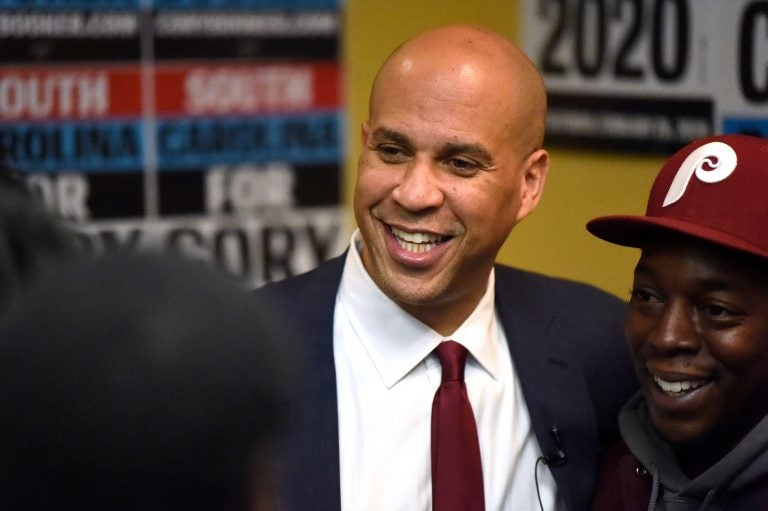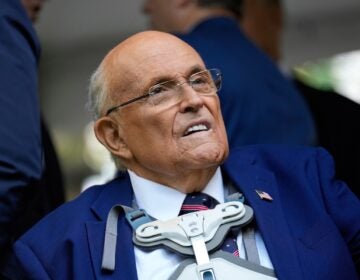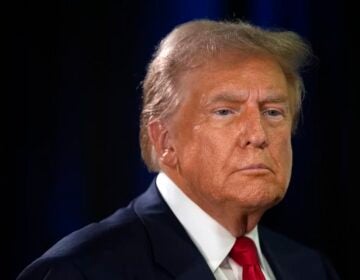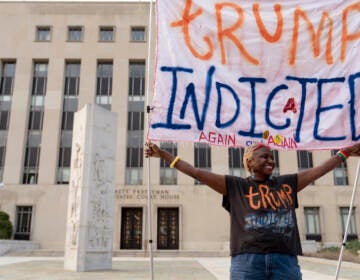Booker extends 2020 campaign outreach to black men in South
Booker held roundtable in South Carolina with roughly three dozen black male voters.

Democratic presidential contender Cory Booker poses for photos after a black men's round table on Monday, Dec. 2, 2019, in Columbia, S.C. (AP Photo/Meg Kinnard)
Democratic presidential candidate Cory Booker focused Monday on extending his campaign outreach to black men, holding a roundtable in South Carolina with roughly three dozen black male voters, some of whom said they have felt overlooked amid a focus on the electoral power of black women.
One by one, the men gathered at Booker’s South Carolina presidential campaign headquarters thanked him for highlighting their concerns. The New Jersey senator, one of two black men seeking the Democratic presidential nomination, said he was mostly there to listen. The men expressed concerns about access to investment capital, preventing kids from getting trapped in the criminal justice system and help for black farmers.
“We have the power to get you elected,” one of the men, Allen Love, told Booker. “There is no reason we shouldn’t vote for Cory Booker for president.”
Black support is crucial to candidates’ success in South Carolina, which holds the first Southern primary next year. Black women, in particular, have long been considered the Democratic Party’s most consistent supporters, but Booker said that doesn’t mean black men’s issues aren’t important, as well.
Of black women, Booker said, “Data-wise, they’re the highest percentage of voters in the entire Democratic Party.” He added, “But fellas, I need your support, too.”
Exit polling from the 2016 election showed that black women were the largest voting constituency in South Carolina’s Democratic presidential primary, comprising 37% of primary voters, compared to 24% for black men.
Asked after Monday’s gathering why he felt black men didn’t turn out as heavily, Booker said he would continue to focus on black voters overall and could earn their support, given his experience living and working in minority communities at the former mayor of Newark, New Jersey.
“We know that this is a lot of work to do, and we’re going to continue what I’ve done in past elections, from being a mayor of a majority black city,” Booker said. “I have a lot of confidence that we can connect authentically with African American communities in this state. … We’ve been talking about this since the beginning.”
In last month’s Democratic presidential debate, both Booker and California Sen. Kamala Harris, a black woman, said the Democratic Party has sometimes come up short in its outreach to black Americans, with Booker declaring, “Black voters are pissed off, and they’re worried.”
One of the men at the roundtable on Monday thanked Booker for being “the first one to do it” on holding a conversation focusing on black men, although at least one other candidate — Harris — has done so previously. Harris has also specifically homed in on black men in South Carolina, in October going to a Columbia barbershop for a conversation on black men’s issues. She returned last month for a roundtable on issues specifically pertinent to black women.
Meanwhile, Booker on Monday earned the endorsement of the nonpartisan Clark County Black Caucus, a group with 400 voting members based in Las Vegas. The group, which endorsed Bernie Sanders in 2016, said Booker has “consistently been a voice for Black Americans on the debate stage, in his policy platform, and media” and understands the root causes of inequities.
Antjuan Seawright, a Democratic strategist in South Carolina, said that such focuses are especially key in this state, where the Democratic primary electorate is heavily African American.
“It becomes a game of inches, and the engagement of this key constituency could be the one thing that separates winners from losers in a contested primary,” he said.
Part of the explanation for lower support from black men, Seawright said, could be attributed to high incarceration rates among black men, as well as post-incarceration restrictions on voting.
“When I think about what the criminal justice system has done for African American men, and the fact that there are so many of us who are locked up, and so many of us who have criminal record issues that hinder us from being able to vote, I think that makes a difference,” Seawright said. “Black men are handicapped when it comes to voter suppression tactics and laws.”
Booker, who closed out Monday’s event by submitting his filing paperwork for South Carolina’s primary, said he was grateful for the conversation and wished he could clear his schedule to stay longer.
“This is a gift,” he said.
—
Associated Press writer Michelle Price in Las Vegas contributed to this report.
WHYY is your source for fact-based, in-depth journalism and information. As a nonprofit organization, we rely on financial support from readers like you. Please give today.




